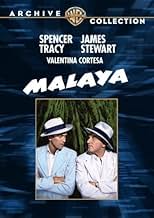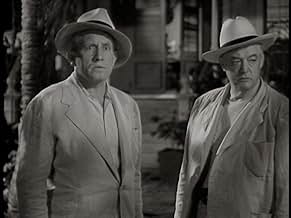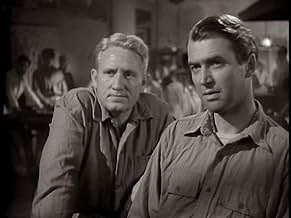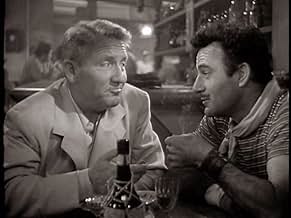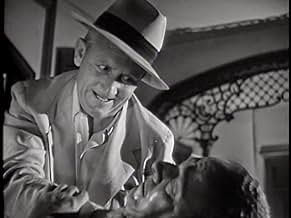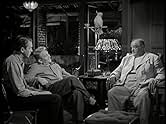NOTE IMDb
6,5/10
1,6 k
MA NOTE
Ajouter une intrigue dans votre langueNewspaperman Royer convinces government officials of a plan to obtain rubber by smuggling it out from under the Japanese. Carnahan is let out of prison to help.Newspaperman Royer convinces government officials of a plan to obtain rubber by smuggling it out from under the Japanese. Carnahan is let out of prison to help.Newspaperman Royer convinces government officials of a plan to obtain rubber by smuggling it out from under the Japanese. Carnahan is let out of prison to help.
- Réalisation
- Scénario
- Casting principal
- Récompenses
- 2 victoires au total
Valentina Cortese
- Luana
- (as Valentina Cortesa)
Lester Matthews
- Matisson
- (scènes coupées)
Joel Allen
- Federal Agent
- (non crédité)
Besmark Auelua
- Henchman
- (non crédité)
George M. Carleton
- Small Businessman
- (non crédité)
Silan Chan
- Malay Girl
- (non crédité)
Spencer Chan
- Chinese Shipmaster
- (non crédité)
Joseph Crehan
- Businessman with Pipe
- (non crédité)
Avis à la une
(Version reviewed is the 90-minute German-language showing on ARD on July 5, 2001.)
There are two rather unbecoming aspects about this movie, one being its blunt nationalism, the other one its odd casting. Where you would have expected, say, William Holden as the daring journalist and, well, Humphrey Bogart as the cynical hotshot, you get Jimmy and Spence. It's not that they don't act well, but the rôles just don't seem to fit. What a difference with handsome Mexican Gilbert Roland who is chosen perfectly (as Romano).
Journalist Royer (Stewart) gets his rival/friend Carnaghan (Tracy) out of prison with help from official sides (fine thesping by John Hodiak) for the good of the nation, that is, to haul all possible rubber out of British, but Jap-occupied, Malaya for the United States. Of course, the European land-owners give all assistance possible to support the sacred case, including a voluntary beating that Ian MacDonald gets from Tracy. America's raw nationalism was curiously carried right into the German translation: dubious Bruno Gruber (played by "Charlie Chan" Roland Winters) is named Marty Robber (or so) in German dubbing version of 1955, because a badman just couldn't have a German name to German audiences... This should be worth a correction, although the forgery effect is not as high as in the original 1952 dubbing of "Casablanca", that was corrected in a new version as late as in 1968. (Stewart, by the way, is synchronized well by Eckart Dux this time, not by regular Siegmar Schneider.)
Although film's humour is well-measured, it cannot conceal, but rather contributes to, the dare-devil chauvinism, four years after the war ended. Tracy played something of a contrary rôle in "Bad Day at Black Rock", as regards the U.S. relationship to the Japanese.
There's a lot of epigonism of "Casablanca", though not as much as in its immediate successors, in "Malaya". We have Richard Loo's Col. Tomura marching into the bar like Maj. Strasser; Italy's Cortese in the European female part (the story might have done without her, were there not some nice dialogues with Tracy); and the wonderful Sydney Greenstreet, who somewhat resumes his Senor Ferrari rôle (that parrot of his is a blue one, I suppose).
Despite this emulation, Frank Fenton's screenplay has something interesting about it that makes this movie agreeable after all. But it wouldn't have taken the famous leading players, close to miscasts, for something that appears like an MGM "B" production to me. - Worst thing is, I couldn't spot DeForest "Bones" Kelley anywhere around, although he is said to be there.
There are two rather unbecoming aspects about this movie, one being its blunt nationalism, the other one its odd casting. Where you would have expected, say, William Holden as the daring journalist and, well, Humphrey Bogart as the cynical hotshot, you get Jimmy and Spence. It's not that they don't act well, but the rôles just don't seem to fit. What a difference with handsome Mexican Gilbert Roland who is chosen perfectly (as Romano).
Journalist Royer (Stewart) gets his rival/friend Carnaghan (Tracy) out of prison with help from official sides (fine thesping by John Hodiak) for the good of the nation, that is, to haul all possible rubber out of British, but Jap-occupied, Malaya for the United States. Of course, the European land-owners give all assistance possible to support the sacred case, including a voluntary beating that Ian MacDonald gets from Tracy. America's raw nationalism was curiously carried right into the German translation: dubious Bruno Gruber (played by "Charlie Chan" Roland Winters) is named Marty Robber (or so) in German dubbing version of 1955, because a badman just couldn't have a German name to German audiences... This should be worth a correction, although the forgery effect is not as high as in the original 1952 dubbing of "Casablanca", that was corrected in a new version as late as in 1968. (Stewart, by the way, is synchronized well by Eckart Dux this time, not by regular Siegmar Schneider.)
Although film's humour is well-measured, it cannot conceal, but rather contributes to, the dare-devil chauvinism, four years after the war ended. Tracy played something of a contrary rôle in "Bad Day at Black Rock", as regards the U.S. relationship to the Japanese.
There's a lot of epigonism of "Casablanca", though not as much as in its immediate successors, in "Malaya". We have Richard Loo's Col. Tomura marching into the bar like Maj. Strasser; Italy's Cortese in the European female part (the story might have done without her, were there not some nice dialogues with Tracy); and the wonderful Sydney Greenstreet, who somewhat resumes his Senor Ferrari rôle (that parrot of his is a blue one, I suppose).
Despite this emulation, Frank Fenton's screenplay has something interesting about it that makes this movie agreeable after all. But it wouldn't have taken the famous leading players, close to miscasts, for something that appears like an MGM "B" production to me. - Worst thing is, I couldn't spot DeForest "Bones" Kelley anywhere around, although he is said to be there.
This film has some really great actors in it - Sydney Greenstreet, Spencer Tracey, Lionel Barrymore, James Stewart, Gilbert Roland, John Hodiak, Richard Loo, etc. And it's got an exotic location (Malaya) and a war-time plot (getting rubber to outfit the US war machine in WW2). But it never manages to get going, maybe because Spencer Tracey was never really an "action" star, or maybe because the director Richard Thorpe, while prolific, wasn't particularly skilled in this genre (he's best known for Ivanhoe, Knights of the Round Table, The Great Caruso, The Student Prince).
It's worth a look, and Barrymore and Greenstreet do their usual wonderful jobs.
It's worth a look, and Barrymore and Greenstreet do their usual wonderful jobs.
I'm an American ex-pat living in Malaysia, so I thought I'd watch this to see if there were any old scenes of life in Malaysia in the late 40's. Well, as I expected, there weren't, BUT the actual movie and story were really well done and interesting.
I thought the dialog in this movie was the best I have heard from this era. I watch a lot of "noir", and this dialog was more realistic with a flair that wasn't overdone. For example, the interaction between Spencer Tracy and his girl wasn't flowery or sappy, it was kind of hip and snappy without being too "40's". Also, every line out of Greenstreet's mouth was sublime.
Casting was awesome! It seemed like everybody was perfect for their role. Greenstreet was fantastic as an almost omnipotent bar owner. Tracy was rough and rugged. Stewart was convincing as a sort-of-drifter that finally finds purpose in his life. Plus, you get a cameo of Lionel Barrymore, which is worth it's weight in gold.
This is a "feel good" movie about losers and dregs of society helping to win the war. It's tough, violent, and not everybody gets out alive. And, it's patriotic without being sappy. Watch this one on the Fourth of July, and you can't go wrong!
I thought the dialog in this movie was the best I have heard from this era. I watch a lot of "noir", and this dialog was more realistic with a flair that wasn't overdone. For example, the interaction between Spencer Tracy and his girl wasn't flowery or sappy, it was kind of hip and snappy without being too "40's". Also, every line out of Greenstreet's mouth was sublime.
Casting was awesome! It seemed like everybody was perfect for their role. Greenstreet was fantastic as an almost omnipotent bar owner. Tracy was rough and rugged. Stewart was convincing as a sort-of-drifter that finally finds purpose in his life. Plus, you get a cameo of Lionel Barrymore, which is worth it's weight in gold.
This is a "feel good" movie about losers and dregs of society helping to win the war. It's tough, violent, and not everybody gets out alive. And, it's patriotic without being sappy. Watch this one on the Fourth of July, and you can't go wrong!
Even with a better cast, this would not have been much of a film. On the surface it looks like it will be some sort of action film, with spies going into enemy territory to steal, or rather negotiate on the black market for, essential supplies. But there's little intrigue and very little action. Most of the scenes are simply characters sitting in chairs talking to one another. The surprise at the very end of the film is so far-fetched as to undercut the credibility of nearly everything else. The love story involves two people who have no reason to be attracted to one another. There are elements of Casablanca here, set in a country occupied by the enemy, a nightclub owner consorting with an enemy officer, the gambling being fixed by the owner to pay someone he wants to do a favour to, and a cynic acquiring higher ideals; but it's all a very pale imitation of Casablanca. Some comments suggest that there is something "noirish" about the film. Well. it's in black and white, but it does not have the requisite sense of evil and foreboding.
But the biggest failure is in the casting. James Stewart is supposed to play a sour, hard-bitten, cynical operator who finds a little patriotism late in life. But Stewart can't help coming across as a nice guy. He may speak the tough words, but the tone is wrong. His eyes shift in that self-deprecating way of his, he carries himself in that modest way of his, and he just doesn't come off as the character he is supposed to be playing. When his partner is punching someone over and over in the face, Stewart looks repelled by the brutality. Spencer Tracy is probably even worse in his role as a tough jailbird who is let out of Alcatraz to help in the mission. He looks old; his figure is dumpy, his way of moving is slow. He threatens a man, but he doesn't seem very scary. (DeNiro would know how to do that.) He is the romantic interest of a nightclub singer who is crazy over him, yet he's way too old for her and doesn't have anything of the sort of animal magnetism that might make him believable as her lover. In fact, to be honest, there were moments when Tracy looked like he couldn't act. The Japanese have been beating him, trying to get him to talk; Tracy frowns a little but registers no pain, no discomfort, no fear; he shakes it off and then looks comfortable. When he dumps his girlfriend to keep her safe, his face shows nothing.
I forced myself to watch to the end because I have an interest in Malaya. On its own terms, this movie would have lost me long before the mid-way point.
But the biggest failure is in the casting. James Stewart is supposed to play a sour, hard-bitten, cynical operator who finds a little patriotism late in life. But Stewart can't help coming across as a nice guy. He may speak the tough words, but the tone is wrong. His eyes shift in that self-deprecating way of his, he carries himself in that modest way of his, and he just doesn't come off as the character he is supposed to be playing. When his partner is punching someone over and over in the face, Stewart looks repelled by the brutality. Spencer Tracy is probably even worse in his role as a tough jailbird who is let out of Alcatraz to help in the mission. He looks old; his figure is dumpy, his way of moving is slow. He threatens a man, but he doesn't seem very scary. (DeNiro would know how to do that.) He is the romantic interest of a nightclub singer who is crazy over him, yet he's way too old for her and doesn't have anything of the sort of animal magnetism that might make him believable as her lover. In fact, to be honest, there were moments when Tracy looked like he couldn't act. The Japanese have been beating him, trying to get him to talk; Tracy frowns a little but registers no pain, no discomfort, no fear; he shakes it off and then looks comfortable. When he dumps his girlfriend to keep her safe, his face shows nothing.
I forced myself to watch to the end because I have an interest in Malaya. On its own terms, this movie would have lost me long before the mid-way point.
Just by chance I was home to catch this terrific movie when it was shown a few days ago on cable TV...what a happy surprise! Both Stewart and Tracy play "good-bad guys" whose inner morality and patriotism rises to the top when the going gets tough. The supporting cast is full of top talent, including super performances from John Hodiak, Sidney Greenstreet, and Lionel Barrymore. Richard Loo and Gilbert Roland both play brilliantly to their "type" and are fine as well, and Roland Winters (usually in pompous comic roles) is very effective as a German rubber plantation owner who should not be trusted! Look for the always-welcome Russel Hicks in the scene on the train, and savor the sound of his elegant voice.
In addition, the script by Frank Fenton is way above average, with very droll and off-hand wit in evidence throughout.
All in all, a first-rate movie which deserves to be much better known!
In addition, the script by Frank Fenton is way above average, with very droll and off-hand wit in evidence throughout.
All in all, a first-rate movie which deserves to be much better known!
Le saviez-vous
- AnecdotesSydney Greenstreet's final film.
- GaffesOne scene features wild chimpanzees. Chimps are natives of Africa, not Malaya.
- Citations
John Royer: You have to remember, this guy's a German.
Carnaghan: Yeah, but he's a greedy man, and greed has a nationality all its own.
- ConnexionsEdited from Les sacrifiés (1945)
- Bandes originalesBlue Moon
(uncredited)
Written by Richard Rodgers and Lorenz Hart
Performed by Valentina Cortese (as 'Luana'), also whistled by James Stewart
Meilleurs choix
Connectez-vous pour évaluer et suivre la liste de favoris afin de recevoir des recommandations personnalisées
- How long is Malaya?Alimenté par Alexa
Détails
- Date de sortie
- Pays d’origine
- Langue
- Aussi connu sous le nom de
- Operation Malaya
- Lieux de tournage
- Société de production
- Voir plus de crédits d'entreprise sur IMDbPro
Box-office
- Budget
- 2 396 000 $US (estimé)
- Durée
- 1h 38min(98 min)
- Couleur
- Rapport de forme
- 1.37 : 1
Contribuer à cette page
Suggérer une modification ou ajouter du contenu manquant

